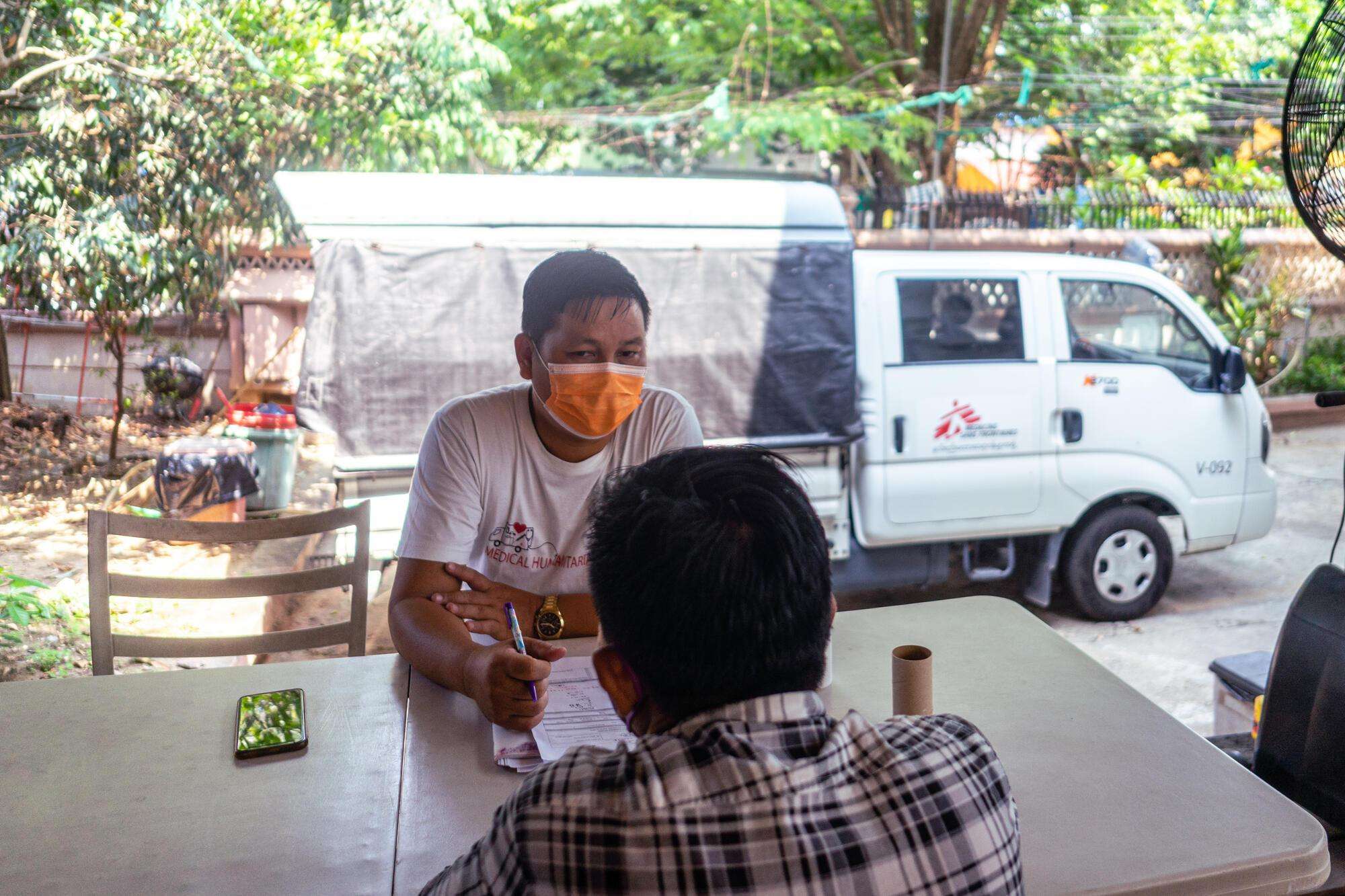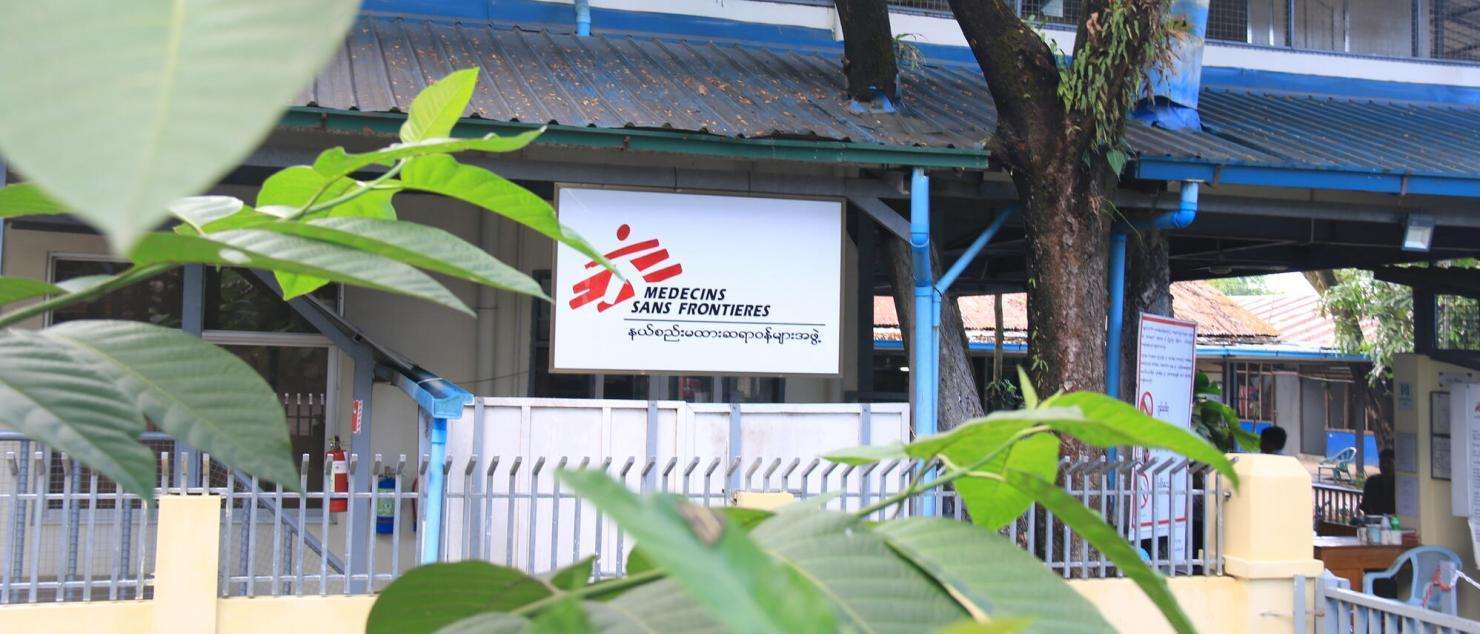As Myanmar approaches four months under military rule, public health services remain severely disrupted, leaving people struggling to access care. Many public hospitals and clinics are closed or occupied by the military, and those that remain open have limited services available while medical staff are on strike. Because the country’s capacity to test, treat, and vaccinate against COVID-19 is a fraction of what it was before the military seized power, a spike in new cases would be a public health disaster.
Doctors Without Borders/Médecins Sans Frontières (MSF) calls on Myanmar’s de facto military government and other groups to take all steps to ensure people have safe and unhindered access to health care, regardless of where they seek it. Medical staff must be able to provide lifesaving care without fear of violence, detention, or intimidation.
Insecurity restricts access to health care
Many patients are forced to choose between seeking treatment at a costly private facility or at a military-controlled hospital where their safety could be at risk, particularly if they have been involved in protests or the civil disobedience movement.
Clinics run by nongovernmental organizations do exist in some locations, but they are unable to cover all the needs and have had their activities restricted by the military authorities. For example, a clinic supported by MSF was visited by security forces, who ordered the emergency beds removed and insisted that all injured people be taken to military hospitals or facilities they control. Police also arrested one of the clinic’s volunteers for being involved in protests and demanded names and addresses of others working there. The facility was forced to temporarily close and is now barely functioning, operated by a skeleton staff. MSF teams have been left with few options for referring patients for specialized treatment.
As a result of these restrictions, many people face risks traveling to access the care they need. Security forces at checkpoints have created a climate of fear, scrutinizing movements, searching people’s belongings, and intimidating individuals in transit. For patients with conditions requiring regular and long-term care, such as HIV, tuberculosis, and hepatitis C, the ongoing insecurity and delays in accessing treatment could be life-threatening.
“What patients are worried about now is if they can access the clinic to get medication,” an MSF doctor in Kachin state said. “If the security forces at the checkpoints don’t let the patients pass, what can the medical personnel do for their patients?”
Attacks on health care workers
Doctors and nurses in Myanmar continue to be targets of violence. Staff working in medical facilities MSF has supported shared reports of medical staff being arrested and detained. There have been 179 attacks on health staff and facilities since the start of the military takeover, and 13 people killed in these attacks, according to the WHO's Surveillance System of Attacks on Health Care.
Media reports have shown emergency medical workers and first responders on the front lines of peaceful protests being shot with live rounds while trying to help the wounded. MSF partners have also witnessed raids on organizations providing first aid to injured protesters, and seen their supplies destroyed.
Economic fallout threatens humanitarian response
As the public health system in Myanmar deteriorates, its economy is also collapsing. Cash is increasingly difficult to obtain, with people facing long lines at sporadically filled ATMs. The kyat, Myanmar’s currency, has fallen 17 percent against the US dollar, pushing up the cost of imports and goods like cooking oil, rice, and fuel.
Humanitarian agencies are not immune to this liquidity crisis. Shortfalls in cash and increased costs can prevent organizations, including MSF, from buying supplies and medications, paying staff salaries, and transporting goods.
We are already seeing the impact of this in our HIV program in Kachin state. Before the military seized power on February 1, MSF had been gradually shifting our HIV patient cohort HIV patient cohort to the government's National AIDS Program. However, these clinics are now no longer open. Nearly 2,000 patients have returned to our facilities for consultations and drug refills, while 200 new HIV-positive patients have been registered.
In Rakhine state, inadequate water and sanitation services have long been problems in displacement camps for Rohingya people, many of whom rely entirely on humanitarian aid for access to clean water. Now that many organizations are scaling back activities as they struggle to access cash and get supplies into the camps, we are seeing a spike in people seeking treatment for acute watery diarrhea related to poor hygiene conditions.
Reignited conflict exacerbates humanitarian crisis
An estimated 60,000 people are displaced inside Myanmar and 10,000 more have fled to neighboring countries since the military seized power, according to the UN Refugee Agency. This is largely due to a resurgence of conflict in Myanmar’s borderlands—particularly in Chin, Kachin, and Kayin states, predominantly between the military and ethnic armed groups. Increasingly, the fighting also involves pro-democracy people’s defense forces. Airstrikes and shelling are forcing people to flee their homes and have caused an unknown number of civilian casualties.
MSF had to withdraw staff from one town in Kachin state due to fighting, temporarily interrupting our services. The sounds of shelling and gunshots have become common in several locations. This insecurity impacts our activities and staff wellbeing, and it raises significant concerns for people’s ability to travel to seek health care.
MSF fears for the people of Myanmar in this worsening crisis. All obstacles preventing sick and wounded people from seeking health care—including the violence, detention, and intimidation of health workers—must be dismantled. Medical staff and humanitarian organizations must be protected from violence and given unhindered access to conflict areas to ensure those at risk can access lifesaving care.
MSF has been working in Myanmar since 1992. Today, more than 1,100 staff provide high-quality care through a network of health facilities and mobile clinics.


